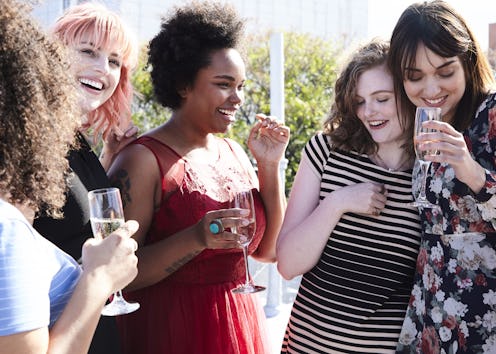Life
Here's Why So Many Women Are Identifying As "Sober Curious"

In a world where we’re quick to put ourselves and each other into boxes, a new alcohol-related trend has started to take hold that defies all that: The sober curious movement. In a nutshell, identifying as sober curious means you know from experience that alcohol doesn’t make you feel great and you don’t drink it often, but you’re not willing to put an all-or-nothing label on yourself.
A handful of influencers, like Lee Tilghman of @leefromamerica and Jordan Younger of @thebalancedblonde, have “come out” as sober curious recently, explaining to their hundreds of thousands of followers that they’ll drink once in a while if the occasion calls for it, but for the most part they abstain — and that’s because alcohol makes them feel bad. And others are starting to follow suit.
“People are more invested in their overall wellbeing [these days],” Ruby Warrington, founder of Club Söda NYC and author of the book Sober Curious, out in December, tells Bustle. “As we change our diet, work out regularly and adopt other wellness practices, it becomes harder to reconcile the way alcohol really makes us feel. I think a lot of people are beginning to ask if a few hours of ‘pressing pause’ on stress, anxiety, or loneliness is worth the inevitable payoff the morning after.”
So, why is the sober curious movement taking off in such a big way? Let’s take a closer look.
Why We’re On The Outs With Alcohol
In a lot of ways, our collective breakup with alcohol has been a longtime coming. The rise of the wellness movement has caused many of us to eliminate toxins from our diet, and there’s no question that alcohol isn’t exactly great for us. Research has shown that alcohol is inflammatory to the body, and a recent global study found that even a little bit of alcohol can be harmful to our overall health. Yikes.
Michelle Cady, a New York-based health coach and author of Self-Care In The City, tells Bustle that when many of us get a taste of how life without alcohol feels, we start to realize that drinking isn’t always worth it. “There is something so freeing about going alcohol-free and waking up hangover-free,” she says. “In 2017 I didn’t drink for 100 days, and I had so much energy in the mornings. I'd wake up at 6:15 a.m. with no alarm, ready to go. I couldn’t remember feeling that great ever.”
How Ditching The Label Helps
So, why don’t we just swear off alcohol altogether? What makes the sober curious movement so unique — and effective — is the fact that people simply go off of how they feel, rather than putting themselves in a restrictive box.
“Identifying as sober curious prevents us from falling into a black and white way of thinking, feeling, and behaving,” psychotherapist Alison Stone tells Bustle. “It can help us better understand our relationship with alcohol, too — when do we drink more than we intended to? Are we drinking because we want to, or because we feel we need to? Having curiosity opens up the possibilities to better understand ourselves and our motives for doing things.”
Stone adds that when we make something prohibitive, it often backfires and we end up wanting the “forbidden” thing more. “That is partially due to the psychological impact of making an extreme decision — there are often parts of us that want to do the exact opposite of that decision.”
In other words, telling yourself you can have alcohol might help you want it less. Of course, being able to "choose" when you turn sobriety on and off is a privilege, and not an option for everyone. If you know or suspect that you have addictive behaviors around alcohol, it’s important to seek professional help and consider abstaining completely.
A Few Questions To Ask Yourself The Next Time You Want A Drink
There’s a pivotal moment in many alcohol-related situations — whether you’re at a bar or you’re ordering at a restaurant — when you could just say no and order a seltzer instead. But whether it’s peer pressure, social anxiety, or stress, many of us end up giving in.
The key? Take a pause in that moment. “I tell many of my clients to try to settle in to the situation before making the decision to drink,” Cady says. “Try sipping on water or club soda for the first 45 minutes of a cocktail party or business dinner, then decide if you want to drink. You'll be surprised to find that you probably don’t want to. Sometimes you'll feel a buzz without alcohol just because of the social connection!”
So if you’ve been feeling pretty “blah” thanks to all that alcohol you don’t need — and might not event want — consider giving the sober curious movement a try. You may find it’s exactly what you need.